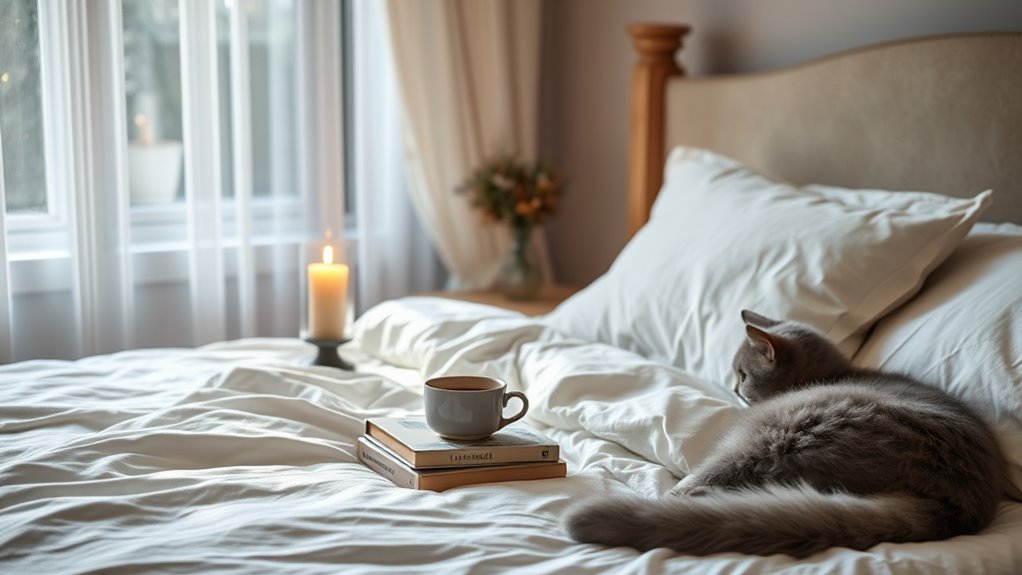This Night Routine Helped Me Sleep Like a Baby
Establishing a consistent night routine can drastically improve your sleep quality. By setting a regular bedtime, creating a calming pre-sleep environment, and limiting screen time, you signal your body it’s time to wind down. Incorporating relaxation techniques like deep breathing or gentle yoga can further enhance your ability to fall asleep peacefully. Pair this with mindful eating and hydration habits for optimal benefits. If you’re curious about perfecting your routine, there’s more to explore on how to enhance your sleep experience.
Understanding the Importance of a Night Routine
Have you ever wondered why a consistent night routine can transform your sleep quality?
Establishing bedtime wellness habits signals your body that it’s time to wind down, helping you transition from the busyness of the day to a restful night.
Research shows that engaging in calming activities, like reading or gentle stretching, can reduce stress and promote relaxation. This practice not only improves your ability to fall asleep but also enhances the overall quality of your rest. Moreover, a simple yet effective sleep and energy routine can further promote restful sleep, leading to increased morning vitality.
Setting a Consistent Bedtime
Setting a consistent bedtime is crucial for your overall well-being.
Research shows that sticking to a routine helps regulate your body’s internal clock, making it easier to fall asleep and wake up refreshed. Additionally, incorporating effective bedtime rituals into your routine can further enhance your sleep quality.
Importance of Routine
Consistency in bedtime fosters a sense of security that can significantly enhance your sleep quality.
When you stick to a regular sleep schedule, your body’s internal clock adjusts, making it easier to fall asleep and wake up.
Research shows that maintaining a consistent bedtime improves sleep efficiency and reduces nighttime awakenings.
You may also find it easier to manage stress and anxiety, as a predictable routine creates a calming environment.
Remember, your body thrives on regularity, so prioritizing a set bedtime can lead to better overall health and well-being.
Embrace this change, and you’ll likely notice the positive effects on your sleep.
Establishing Bedtime Consistency
Creating a consistent bedtime is crucial for optimizing your sleep quality.
When you go to bed and wake up at the same time daily, your body’s internal clock adjusts, making it easier to fall asleep and wake up refreshed.
Research shows that irregular sleep patterns can lead to fatigue and mood swings.
Start by setting a bedtime you can stick to, even on weekends.
Gradually adjust your schedule if needed, allowing your body to adapt.
Remember, consistency helps regulate your sleep-wake cycle, so prioritize this habit.
Your mind and body will thank you for the restful nights that follow.
Creating a Relaxing Pre-Sleep Environment
To create a relaxing pre-sleep environment, start by adjusting the lighting in your space. Dim, soft lighting can signal your body that it’s time to wind down, helping to promote better sleep quality. Pair this with comfortable bedding essentials to ensure your body feels supported and relaxed as you prepare for rest. Additionally, incorporating effective bedtime wellness habits can significantly enhance your overall sleep experience.
Dim Lighting Effects
Soft, warm lighting can transform your bedroom into a sanctuary for rest. Research shows that dim lighting signals your body to produce melatonin, the hormone that promotes sleep. To create the perfect ambiance, consider the following:
| Light Source | Benefits | Tips |
|---|---|---|
| Candles | Creates warmth | Use unscented ones |
| String Lights | Soft, inviting glow | Hang them low |
| Dimmable Lamps | Adjustable brightness | Set to lower levels |
Comfortable Bedding Essentials
A good night’s sleep often starts with comfortable bedding essentials that cater to your personal preferences.
Invest in a quality mattress that supports your body type and sleeping position.
Soft, breathable sheets made from natural fibers like cotton or linen can regulate temperature, enhancing comfort.
Don’t forget a supportive pillow that aligns with your neck and head, preventing discomfort.
Layering your bedding with a cozy blanket or duvet can add warmth.
Lastly, consider your bedroom’s overall atmosphere; a peaceful environment promotes relaxation.
Limiting Screen Time Before Bed
Although it might feel tempting to scroll through your devices right before bed, limiting screen time can significantly improve your sleep quality. Research shows that blue light emitted from screens interferes with melatonin production, making it harder for you to fall asleep.
Try setting a digital curfew an hour before bedtime. Instead of binge-watching shows or scrolling through social media, consider engaging in calming activities like reading a book or journaling. Incorporating simple breathing techniques can further enhance your ability to relax and transition into sleep.
You’ll not only enhance your sleep but also give your mind a much-needed break from the constant stimulation of screens. Prioritizing this shift can lead to more restful nights.
Incorporating Relaxation Techniques
Incorporating relaxation techniques into your nightly routine can significantly enhance your ability to unwind and prepare for sleep.
Practices like deep breathing, progressive muscle relaxation, or gentle yoga help reduce stress and lower cortisol levels, promoting a sense of calm.
Try dedicating 10-15 minutes to these techniques before bed.
You might also consider guided meditation or listening to calming music, both shown to improve sleep quality.
Creating a serene environment, dimming the lights, and focusing on your breath can signal your body that it’s time to rest.
Incorporating effective breathing techniques can also energize your day while helping you wind down at night.
These small adjustments can transform your sleep experience and leave you feeling rejuvenated.
Mindful Eating and Drinking Habits
Mindful eating and drinking habits can play a crucial role in your nighttime routine, influencing both your digestion and sleep quality.
To enhance your evenings, consider these practices:
- Limit heavy meals: Eating large meals close to bedtime can disrupt sleep.
- Choose light snacks: If you’re hungry, opt for foods that promote sleep, like almonds or bananas.
- Stay hydrated: Drink water throughout the day, but limit intake right before bed to avoid nighttime trips to the bathroom.
- Savor your food: Take time to enjoy your meals, which can reduce overeating and promote relaxation.
Making these adjustments can lead to better sleep. Additionally, incorporating mindfulness into your eating and drinking habits can further improve your overall hydration, sleep, and self-care practice.
Evaluating and Adjusting Your Routine
How do you know if your nighttime routine is truly serving you?
Start by reflecting on your sleep quality and overall well-being.
Are you waking up refreshed or feeling groggy?
Track your sleep patterns and note any changes after adjusting your routine.
Incorporate a wind-down activity, like reading or meditation, and observe how it affects your sleep.
If you’re still struggling, consider shifting the timing of these activities or eliminating distractions, like screens.
Remember, it’s okay to experiment—what works for others mightn’t work for you.
Stay flexible and adjust until you find the right balance for your needs. Additionally, recognize that restful sleep is essential for enhancing skin health and overall appearance, so prioritize finding your unique routine.





